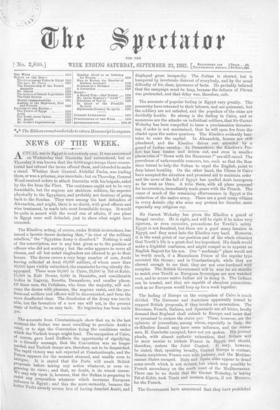The accounts of popular feeling in Egypt vary greatly. The
peasantry have returned to their labours, and are quiescent; but the soldiery are not satisfied, and the populace of the cities are decidedly hostile. So strong is the feeling in Cairo, and BO numerous are the attacks on individual soldiers, that Sir Garnet Wolseley has been compelled to issue a proclamation threaten- ing, if order is not maintained, that he will open fire from the citadel upon the native quarters. The Khedive evidently hesi- tates to enter the capital. In Alexandria, houses are still plundered, and the Khedive drives out attended by a guard of Indian cavalry. In Damanhour, the Khedive's Pre- fect has been beaten and driven out, and even in smaller places cries of" Down with the Nazarenes !" are still raised. The prevalence of unfavourable rumours, too, such as that the Rue- sians intend to help the Sultan to expel the English, point to deep latent hostility. On the other hand, the Ulema in Cairo have accepted the situation and promised aid to maintain order and the news of the fall of Egypt has quelled Arab insurgents as far west as Oran. A tribe there, with all plans prepared for insurrection, immediately made peace with the French. The cause of much of the remaining effervescence in Egypt is the extinction of the native army. There are a good many villains in every Asiatic city who seize any pretext for disorder, more especially any religious cry.






























